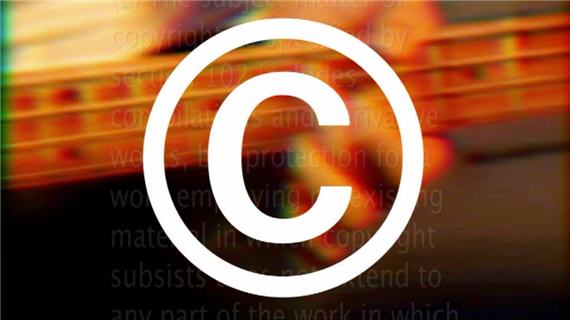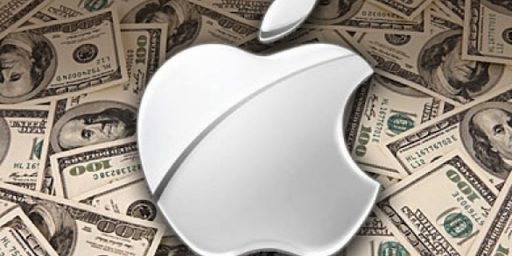Government Orders Massive Increase in Streaming Rights Fees
A government panel has mandated a 50% increase in the revenue share streaming services pay songwriters and music publishers.
I stumbled across a Reuters piece headlined “U.S. to make streaming services pay more for music” and was intrigued by the notion that the U.S. should have anything to do with what streaming services pay for music.
U.S. copyright authorities on Saturday decided to increase over the next five years the royalty payments music streaming companies like Spotify and Apple Inc (AAPL.O) must make to songwriters and music publishers, a trade association for music publishers said.
The Copyright Royalty Board of the U.S. Library of Congress issued a written decision that altered the formulas used to determine how much of their revenue streaming companies must share with songwriters and the music publishing companies they typically hire to collect licensing fees on their behalf.
The National Music Publishers Association said the ruling, which has not yet been made public, will require streaming companies to give 15.1 percent of their revenue to songwriters and music publishers. The previous rate was 10.5 percent.
The board, which consists of three judges, held a trial last year in which the trade group squared off against Spotify, Apple, Alphabet Inc (GOOGL.O), Pandora Media Inc (P.N) and Amazon.com Inc (AMZN.O), which had opposed NMPA’s proposed rate increase.
I have no basis for forming an opinion as to what the proper royalty rate might be. But I was puzzled that the U.S. government, in the form of a three-judge arbitration panel, would be the mechanism. It turns out that it’s been that way for years. The Copyright Royalty Board, whose website looks like something from the 1990s, was created by something called the Copyright Royalty and Distribution Reform Act of 2004 and has been issuing rulings of this sort since May 2005. It, in turn, replaced something called the Copyright Arbitration Royalty Panel.
Now, it makes sense to me to have some sort of arbitration panel in place, given that copyright law is highly specialized and therefore unsuited for the general court system. But music labels aren’t a public utility. Why is it a matter for government concern what rates they negotiate with streaming companies?







There’s no case to be made that the state should be in the business of guaranteeing someone’s profits.
I wonder if this stems from the original copyright agreement from way, way back? My understanding of that was that publishers were using their almost absolute power to gate access to the market to uniformly screw songwriters and arrangers out of any ongoing compensation. Although since there were a number of competing publishers it was not technically an anti-monopoly play, it was considered in the same vein since the artists were “free” to go to tiny little publishers who had no sway in the marketplace, or take their small payment and get nothing down the line. Further, it was shown that the publishers often didn’t even honor their paltry agreements, basically telling the artists that a) they could sue them (difficult since a poor artist was suing a giant company) and b) if they caused trouble they would be blacklisted. Remember, these are not technically the performers here, but rather the songwriter and arranger, so they didn’t have a lot of public sympathy.
So the artists did what many do when faced by malignant companies with all the power, especially when it was made clear to them that if they tried to unionize they would never work again: they appealed to their duly elected representatives. I would guess there were a lot of remedies discussed but what the publishers finally agreed to was that the songwriter and arranger of any piece would get a guaranteed amount from proceeds, including fees paid by radio stations when they played a song. I want to say this was 2.5% each, but I’m not sure. The publishers couldn’t use their outsize power to “negotiate” this back into their own pocket.
Want to know if the Beatles all got equal shares of their album sales? Just take a look at who is listed as arranger and composer on the your forty-five RPM record. Lennon and McCartney. McCartney and Lennon. Over and over again, with the occasional Starr (Starkey?) or Harrison thrown in. In fact, this agreement changed music. Previously, it was not the norm for superstar performers to write and compose their own work. Sinatra comes to mind. But the concept of the singer/songwriter came into the forefront so heavily that during the 70’s a rock band that recorded more than the occasional cover would not be treated seriously.
Congress has passed countless laws that benefit companies, sometimes single companies. Oil exploration credits. Farm subsidies. Depreciation. Railroad right of ways. Umpteen different laws that favor US airlines, or US shipping companies. And self identified conservatives or libertarians may grumble a bit, in a half assed theoretical way. But when a bunch of poor folk get together and get one stinking law passed in their favor that’s when they get outraged at a gut level. Why do you think that is?
(Not singling any conservative out here, including James or Ben. This is a general observation)
@MarkedMan:
Very few people I know, either on the right or left, think that government should set business compensation rates by fiat. Particularly in the age of digital media where publishers have greatly diminished power over artists thanks to digital distribution. The benefits of this aren’t going to primarily fall on “poor folk,” they’re going to be a huge compensation increase to the Rihanna’s and Taylor Swifts of the industry.
I can’t say that I would have thought this was set by three anonymous people, but you learn something new every day! (Well, unless your initials are DJT.)
@Andy: Sure, the music giants will get a boost here, but it should help the starving artists a bit, too. At least the ones that your favorite streaming service suggests to you … (hmm, seems like the power has switched from publishers to somebody else … but still not the musicians)
@Andy: Actually, I’m pretty sure this will not have an affect on the Rihanna’s, Beyonce’s or Taylor’s in their negotiations. I’d be willing to bet a large amount of money that they are not getting the minimum compensation dictated by law.
There’s another side of the argument. The original deal was negotiated when “publishing” meant everything from arranging studio time and engineers and session people, to editing and mixing, to recording a master tape and then manufacturing 1000’s or 1M’s of records, cassettes and CDs, boxing them up and distributing them, and handling all of the logistics involved in unsold returns and so forth. Publishing today consists primarily of authorizing a couple of dozen digital distribution entities to press the “Available” checkbox on their download mechanisms. Sure, all of this is still done for Taylor Swift, but not for the 1000x more prevalent struggling artists.
And the government is not setting prices, but instead updating a percentage agreement that dates back decades. And I come back to what I said above: why is it that this is worth a post, but we generally just accept the much much more intrusive and pro-big industry regulations for corn and soybeans and dairy, for coal and oil and gas, for sugarcane and honey, for telecoms and cable companies?
@Ben Wolf:
IDK.
I’m pretty sure the govt guarantees Tesla’s profits as well. All those tax subsidies for “green” cars.
And to MarkedMan’s point: maybe it’s time we get rid of all those govt subsides. To every company. From Big Oil to Big Battery.
“Why is it a matter for government concern what rates they negotiate with streaming companies?
@TM01: Getting rid of all subsidies is of course an obvious recourse. But it’s not just subsidies. There are many, many laws that are written to favor big companies over smaller entities or the employees that work for them. And the reality is that the big companies have lawyers and lobbyists and for-hire think tanks like the Heritage Foundation who will relentlessly and patiently spend $10M’s to save $10B’s. The little guys don’t have anything like that. They can’t hire the beautiful honey tongued spokesmen to appear on their behalf in front of regulators or on Fox News where Hannity et al strokes them and vilifies the working guy. The little guys have unions and a few of their elected representatives. And there is nothing so called conservatives seem to hate more than a union, unless it is someone like elected representative Elizabeth Warren and her Consumer Protection Agency. And they have spent decades pulling down unions whenever they have the chance and savagely attacking the Elizabeth Warrens of the world.
Which is why I find it fascinating: why is it that a single individual that gets an advantage causes outrage, but an entity that does the same is a smart business? Why is it that a basketball player that gets a $100M contract is greedy, but a CEO who negotiates a $500M package while his company is losing market share is a great businessman, someone to be admired?
@MarkedMan: I’m not opposed to government intervention to assist a worker (and performers, songwriters are workers) get their just compensation. To the contrary I’m wholely in agreement with Adam Smith that government should intervene on behalf of, in his words, the working man, and against government intervention when it benefits the Masters. The way in which the royalties work is that people who contributed nothing and/or profit from ownership will get an additional stream of income, which they will disproportionately give to themselves.
I do believe this authority to order an increase in rights fees goes back to some obscure copyright/fair use determination. Having known many musicians over the years, I don’t begrudge them the increase.
On a tangentially related subject; It appears Trump is considering nationalizing the to be implemented 5G cellular network.